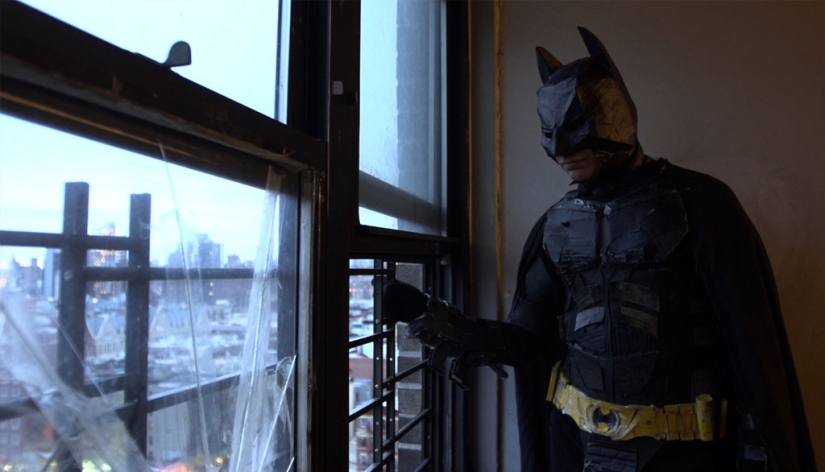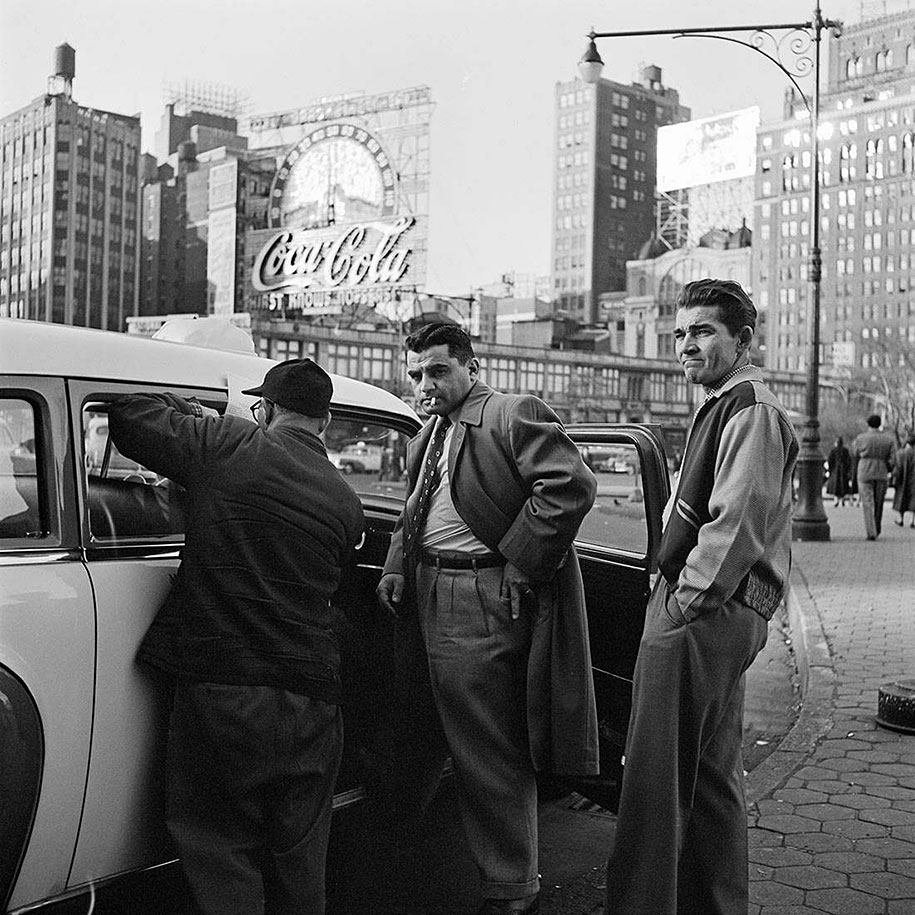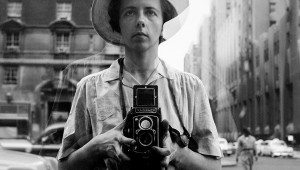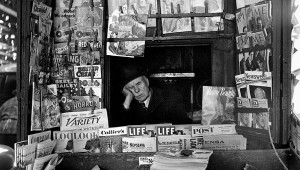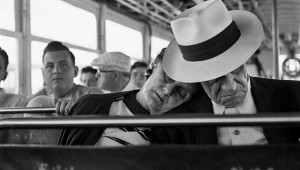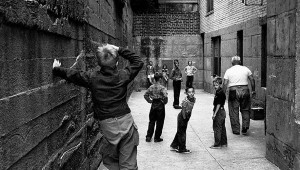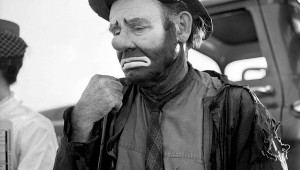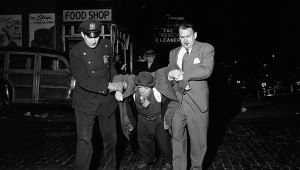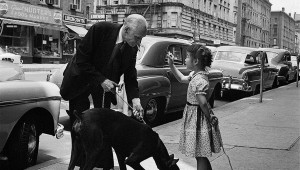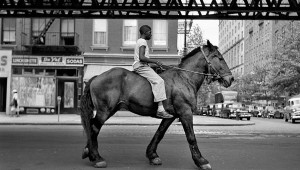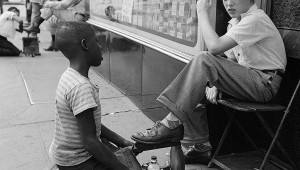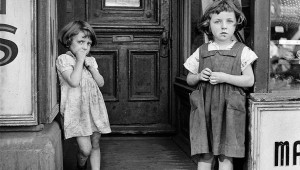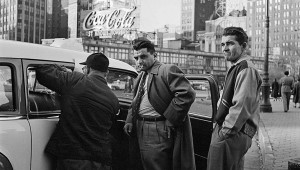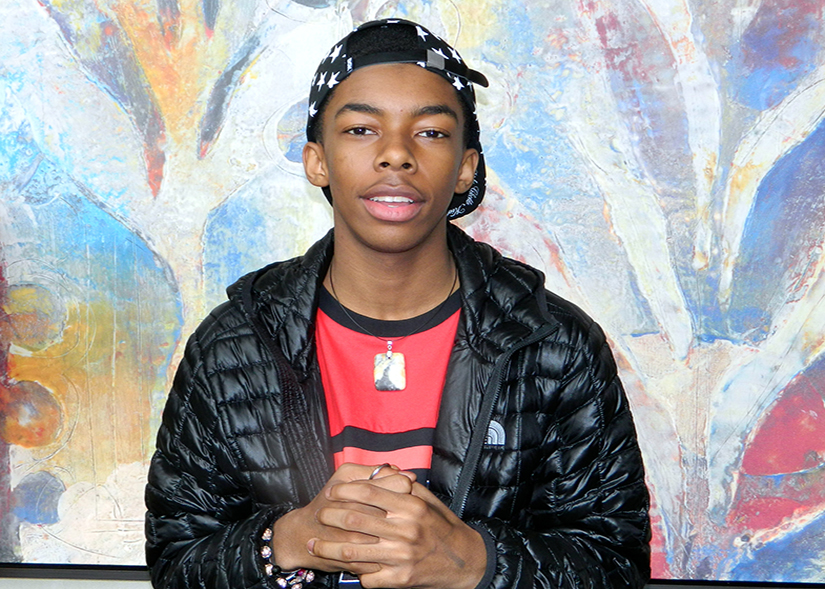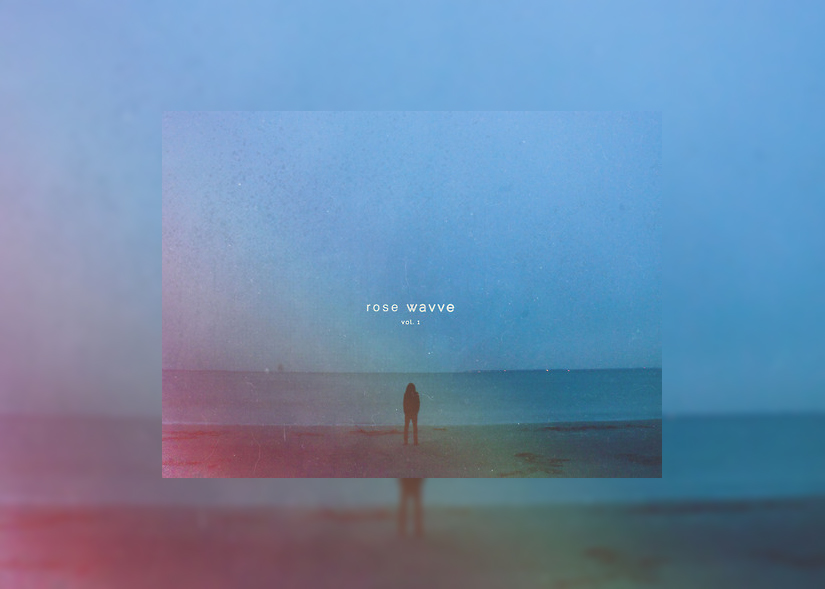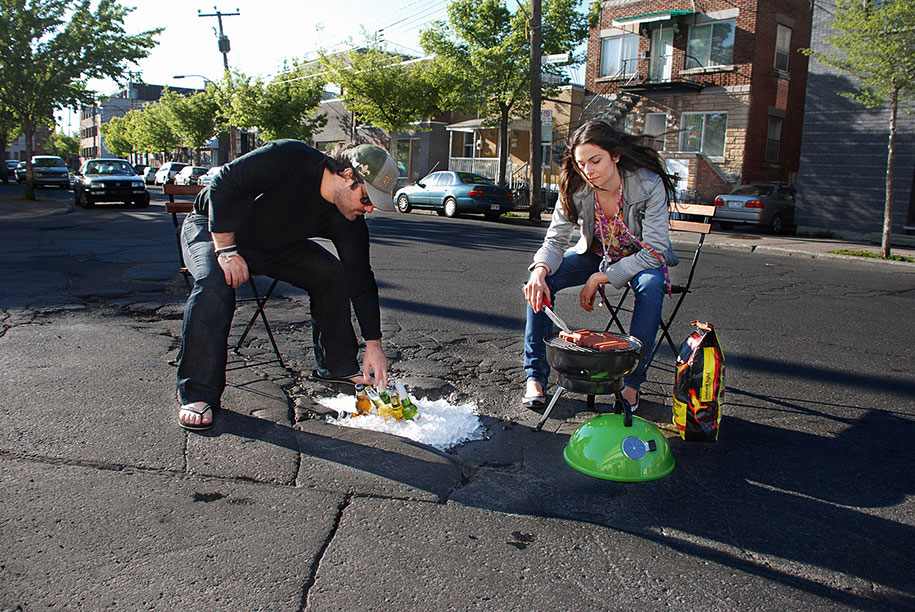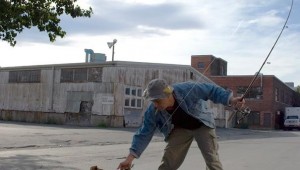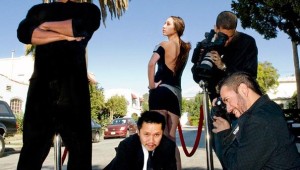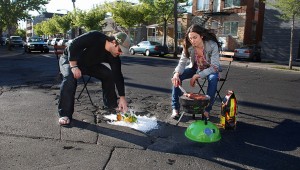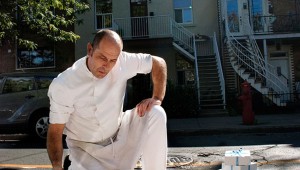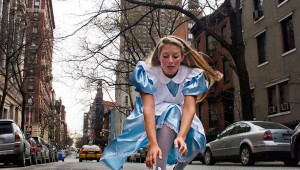The Wolfpack Is a Problematic Documentary Rather Than a Quirky Delight
Given its overuse, the word "problematic" can seem so mealy-mouthed and equivocal. Yet "problematic" is the word that came to mind after I watched Crystal Moselle's documentary The Wolfpack, which comes out today in New York and Toronto and opens in more theaters across the country next week.
The Wolfpack chronicles the lives of the Angulo brothers, six teenage boys and young men who live in Manhattan. For most of their lives, their parents forbade them from leaving their Lower East Side apartment. The six brothers and their sister were homeschooled and prevented from seeing the outside world. While there's a specter of physical and psychological abuse throughout the film, the Angulo boys find an oddly joyous outlet via home video recreations of movies such as Reservoir Dogs and The Dark Knight. Moselle captures the Angulo brothers just as they are beginning to get out of the apartment and assert their own agency.
There have been a few accusations that the film is a fabrication and that the story that Moselle found was too riveting to be true. That's not an issue to me. Moselle explained her filmmaker process and how she first encountered the Angulo brothers in various interviews (this interview Moselle did with Tasha Robinson of The Dissolve is quite good), so I don't think matters of fabrication need to be answered any further. What I found problematic was the film's form of presentation, which is both intriguing and yet incomplete. It leaves so many questions about the Angulo family either unanswered or seemingly unasked, and it made me wonder about the difficult and delicate relationship that documentarians have with their subjects when the subject matter is troubling.
[iframe id="https://www.youtube.com/embed/rDbqcMfUdlI" align="center" mode="normal" autoplay="no" maxwidth="825"]
From a distance, the situation of the Angulo brothers sounds like a potential casserole of indie movie quirkiness. Their forced internment in the apartment, their positivity in the face of the situation, their recreations of popular films, the verite style in which the documentary is shot--it's like some mash-up of The Unbreakable Kimmy Schmidt, Be Kind Rewind, and Grey Gardens. I sense the Angulo's film recreations helped endear The Wolfpack to the Sundance crowd, and there is something oddly quaint about seeing boys do a scene-for-scene remake of The Dark Knight Rises in homemade cardboard costumes. But that quirkiness and lightness is at odds with the grimness of the boys' situation. This is an intentional tension in the film's tone, and while a fascinating disjunction on one level, it took me aback and I'm still not sure how to feel about it.
The film recreation aspect seems like a feel-good selling point for The Wolfpack, though it's just one facet of the Angulo brothers' much more complicated interior lives. They're redoing a Tarantino movie with cardboard guns--how cute. They've been kept prisoner by a domineering and emotionally distant father--ummm, yeah. I kept wondering about the Angulos using film as a tool for socialization and whether or not it worked for them, and why their father who hated the violence and vice of the outside world would let them watch movies full of violence and vice (and then allow the boys to recreate it). There's so much to unpack and to explore that's glossed over. Though to be fair, all that material is so loaded and layered. Maybe a verite documentary can only delineate the broad contours of interior lives rather than the various textures and fine details--character sketches rather than full portraits.
The entire relationship between the boys and their parents similarly gets the contour treatment. While the boys' mother Susanne seems warm and receptive (though not all there), their father, Oscar, is cold and hesitant about saying much of anything. Before Oscar winds up on camera, he's viewed furtively. The film's structured in a way that suggests Moselle, through greater interaction with the boys and Susanne, is slowly earning the limited trust of the Angulo patriarch. Oscar sticks mostly to his room, a presence more than a person, which seems like a perfect analog to the emotional and psychological relationship that he has with his sons, his daughter, and his wife. We never get close enough to Oscar for a full sense of his motives. One wants to ask Oscar--confront him, even--with so many questions. Why did you do this to your children? How could you put a family through this? Oscar isn't one to answer, and maybe to maintain access to the boys and their story, Moselle had to be delicate in asking these questions, or even just determining whether or not these questions could be asked.
There's even more to the Angulo story that The Wolfpack either leaves unanswered or unasked. In the Dissolve interview linked to above, for instance, I learned that the Angulo daughter has Turner syndrome (TS), which is similar to Down syndrome, and I wondered about the challenges of raising a young girl with special needs in such an enclosed and difficult environment. That's never brought up in the film by the Angulo boys. I mentioned the issue of physical and psychological abuse as a specter, and that's precisely what the elephant in the room remains. While abuse is alluded to, I'm not sure if allusion is enough given how serious the matter is and how that must have been part of Oscar's power over his children and his wife. Late in the film, Susanne is speaking to her parents whom she's lost touch with over the years, and I wondered "What's the story there?" By the end of The Wolfpack, I'm still left wondering.
Moselle's approach, both distanced and delicate, may also have been her way to protect the Angulo brothers from her own opinion of their upbringing. Being too forceful with these boys and young men, or leading them with her own observations about their family situation might have done more damage than good. Instead of molding or training the Angulos to some emotional confrontation with their father, Moselle seems like she just wants to observe, to let them be themselves, and to let nature run its course. The old line is that sun is the best disinfectant, and by staying out of the way as much as possible, Moselle might simply be letting the Angulo family get some much needed light. Though to that, with so many questions to ask after seeing the film, the scrutiny on the Angulos will necessarily increase. Their story is so fascinating and it's also a work-in-progress, much like the children's personalities.
It's been said that we're in a golden age of documentaries. The Wolfpack is just one of three non-fiction films coming out this summer that will likely be on people's minds come Oscar time. (The other two are Matthew Heineman's Cartel Land and Joshua Oppenheimer's The Look of Silence.) I go back and forth about my feelings over The Wolfpack, yet I think it belongs in this company. On the one hand, The Wolfpack is a glimpse into these people's lives with an approach that leads to a number of problems, and yet it's precisely because of this approach that I can't stop thinking about the film. I can't stop thinking about the Angulo family either, for that matter, and that may be the sure sign that Moselle's film is ultimately a problematic success.
Nearly Lost Street Photography of NYC and Chicago from the 1950s-60s by Vivian Maier
Photos by Vivian Maier
Amazing New York street photographer, Vivian Maier, took thousands of photos in the 1950's and 60's that went unacknowledged until recently. In 2007, historian and collector John Maloof found a box with thousands her of black and white photography and film negatives, and struck gold. In 2011, only 2 year after her passing, he published a book of her photography and started traveling through exhibitions in the U.S. and Europe, gaining the acknowledgment that she rightfully deserved. A true story of fate and destiny.
For further background on this miraculous story, Maier was born in New York in 1926, lived in France and then returned to New York in 1951 where she lived for five years. In her time back in NYC, she wandered the streets with her Rolleiflex twin-lens reflex camera, and snapped pictures wherever she went. Later, she moved to Chicago to work as a nanny and did that for forty years, taking tons of photos into the late 1990's, all with a unique perspective. Throughout all these years, Maier ended up leaving a body of work comprising of over 100,000 negatives that she never shared with anyone, and many she never saw herself.
Now, her body of work has gone on to receive critical acclaim after 50 years of shooting them, and all to the credit of John Maloof. In 2007, after purchasing a box full of Maier's negatives for $400 at a local thrift auction on Chicago's Northwest Side, he realized that he stumbled upon an amazing set of photography to share to the world. And we're all glad he did.
Through the power and grace of black and white photography, the following photos capture a raw beauty of mid-century, metropolitan city life in America. The story and photography is all so captivating that it even inspired a documentary film, titled Finding Vivian Maier, and is showing in select theaters now. Also be sure to check out the official trailer, and more find more of her work here.
[Via Demilked]
[SXSW Interview] Bishop Nehru Embodies 'The Twenty Year Loop'
Photography by Asia Ashley
For the length of my career covering music, one theory has always stayed planted firmly in the back of my mind. Explained to me in one of my first interviews, with 9th Wonder in 2009, the 'Twenty Year Loop' has shaped much of the way I have consumed and understood music, culture and art since. The idea is somewhat simple, that every two decades, themes, aesthetics and ideas will re-emerge and manifest themselves once again in popular culture. It can explain the current 90s trend we're enjoying, the bell bottom craze of the late 90s and even bridge to presidents No. 41 and 43. I've never been more eager to sit down with an artist to discuss this phenomena than I was last week in Austin as I arrived at The Omni Hotel to talk to 17-year-old NYC phenom Bishop Nehru. The young artist from Rockland County, NY has a distinctly Nas-like flow that is easily recognizable throughout his breakout project, Nehruvia which was released last year. If we're following the Twenty Year Loop to a t, then that would put us in 1994. On April 19 of that year, Nas released a little project by the name of Illmatic, which can be fully felt on every rhyme Nehru spits. In essence, Bishop Nehru is the Twenty Year Loop personified. This is not to say he is a carbon copy of Nasir Jones, far from it. Instead, the point is to draw a map of the way influences work and how they manifest in music today. To be sure, Nehru has set himself up for a productive career in hip-hop, having been tapped by WorldStarHipHop as their 'Rap Act of the Week' in July 2012 at age 15 for an 8-bar freestyle over Mos Def's "Mathematics". Since then he has garnered co-signs from his idol, Nas, opened for Wu Tang Clan on their 20th Anniversary Tour and positioned himself as the true boom-bap artist to be reckoned with. Currently working on his MF Doom-produced project which he calls 'the first project he's been proud off all the way through,' epect to hear Bishop Nehru's name talked about a couple decades from now when influences get brought up. Check out my Q+A with the budding east coast MC.
50 Cent Leaves Shady/Interscope, Releases "Funeral"
It doesn't seem like a big thing, a major artist leaving his record deal after more than a decade relationship. People grow, things change and circumstances often dictate changing where one does business. This is not the case for 50 Cent and his departure from Jimmy Iovine's behemoth Interscope Records. To be sure, 50 Cent is a dinosaur of sorts navigating a new, somewhat unfamiliar landscape. His 2003 album Get Rich or Die Tryin' broke sales records and firmly placed him amongst rap's elite. I may be wrong on this, but, at least for my adolescent self, Get Rich or Die Tryin' seemed to be the last major, MTV-fueled hip-hop album to really make a mark. Obviously, The College Dropout followed a year later, eventually pitting 'Ye and 50 against each other in a sales battle upon the releases of Graduation and Curtis in 2007, which 50 was beaten.
50 exiting the major label industry is a big deal. It leaves Eminem honestly as one of the last holdovers for the major label format that existed a decade ago, and that only because of his individual label, Shady, which 50 Cent was a part of. Back in 1999, with the advent of Napster, we saw the inklings of what the music industry would become, a business that is just now manifesting itself with Grammy award-winning acts not signed to a major and acts putting out free projects that reach the charts. 50's decision to release his next project, Animal Ambition through Caroline, a distributorship owned by Universal. Similar to the deal Macklemore & Ryan Lewis employed with The Heist, albeit with a lot more of a budget thanks to smart business moves by Fiddy over the years. “I have had great success to date with Shady/Aftermath/Interscope, and I’d like to thank Eminem and Dr. Dre for giving me an incredible opportunity,” 50 Cent said in a statement. “I’ve learned so much from them through the years. I am excited to enter this new era where I can carry out my creative vision.”
50 Cent's independent debut will begin on June 3 with Animal Ambition, an unexpected turn for fans who expected the long-teased project Street King Immortal. “I recorded so many album-quality songs that I’m going to put the Animal project out as my viral marketing plan and then [Street King] will come out after,” he explained at a recent press conference. “[Animal Ambition] is about prosperity ... ambition and prosperity.”
Check out the video for 50's new song "The Funeral," released today, below.
[youtube id="l-9pGIDsyvs"]
[Mixtape] Justin Rose: "RoseWaVve Vol. 1"
Late last year we profiled New York City product Justin Rose as part of our First Look series. At the time, the 23-year-old producer was hard at work on his debut, while also finishing work on frequent collaborator Kris Kasanova's project. Today, we finally get the product of that hard work as Rose's follow up to last year's release, 22kt: The Instrumental Tape, RoseWaVve Vol. 1 hit the net today with a premier on his own website, Rsgldthewrld.com. The latest features Rose both producing on the back end of the tracks and gracing the songs with his own flow. Tearing down the wall between producer and rapper can be a tightrope job, but Rose does it admirably here. On "Fear and Loathing" Rose transitions between rhyming in a variety of cadences while also helping on the hook. Here he sounds like what I believe Chief Keef might have been had the lean and bad decisions not gotten to him, with a wavy feel to it. Kasanova links up with him on "On It (How 2 Make It In America)" for what is a kick back in itself. The production alone is something to take note of as well. "Moving Tho" is an airy alternative r&b beat that floats off with a dreamy guitar line. The waves are certainly present here and Rose's latest is not to be missed. "Party4Me" is a potential club banger with huge drums paired with a clever hook and interesting inverted guitar riffs, showing the project can straddle several situations.
As artists across the country are coming up with more talents at their disposal, Rose's latest project proves he can hang with the best of them in this stepping out from the boards. Hit the link below to get the free download for the project and keep an eye out for much more to come from Justin Rose.
Photographer Duo Turns Annoying Potholes into Art
Photos by Photographer duo Davide Luciano and Claudia Ficca
Potholes are a driver's nightmare and with this Winter's cold wrath, it seems that they have multiplied in cities across the nation. While most of them go unfixed, Photographer duo Davide Luciano and Claudia Ficca managed to turn these annoying city potholes into works of art in their ironic photo series, “My Potholes".
The idea for this series was inspired from their individual experience after hitting a pothole in their own neighborhood in Montreal, an experience we city dwellers can all relate to. Eventually, the idea broadened into creating various imaginative scenes within the backdrops of New York City, Los Angeles, Toronto and Montreal, where street cracks and potholes play a major role in the everyday commute. Each scene directly engages the street and the city, transforming the bad into good, creating surreal scenery while adding perspective on how we are connected and affected by the environment around us. It's definitely an interest concept.
Check out the following photos and find more here.
[Via Demilked, MyPotholes]
Stream Kitty Cash's Latest Mix for SSENSE
Last month, when I had a chance to catch up with up and coming New York City DJ Kitty Cash on the heels of her well-received Love The Free mixtape she expressed her eagerness to get right back to work after having finished one project. "As soon as I was done, I was like, 'Damn, I can’t wait to work on part two'." Well, we got the latest from Kitty Cash last night as she continues to craft interesting and ear-catching mixes, this time for the likes of SSENSE. The piece of work brings together elements of airy 808s and features the likes of Kanye, Tinashe, Tamia, Sade and Beyonce to help you chill out while hiding indoors from the polar vortex. Check out the full stream of Kitty Cash's latest mix streaming below.
[Video] ABGOHARD: "Yung God"
New York City has been re-establishing itself as a place for quality underground hip-hop over the past few years with a huge resurgence of talented artists that have allowed themselves to branch into increasingly different and interesting strands of what hip-hop can be, somewhat erasing many boundaries that had rendered the genre incognito and stale out east.
One of these pockets of music that we've been paying attention to as of late is the Inner City Kids crew, led by Decon-signee and RH First Look artist Aaron Cohen. Cohen's collaborative partner on his track "NickVanExelRose", ABGOHARD, recently dropped his video for his own single, "Yung God" which is produced by Yuri Beats and was premiered today on The Village Voice. The ICK guys often have their tongue planted firmly in cheek as they pair clever rhymes with heavy production and the latest from the clique is no different as underlying humor exists throughout. Check out the latest from ABGOHARD, streaming below.
[youtube id="VfR6zv19jKA"]


